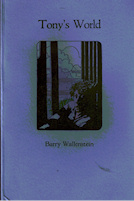nycBigCityLit.com the rivers of it, abridged


Reviews
Tony's World by Barry Wallenstein

Tony's World
by Barry Wallenstein
Birch Brook Press, 2010; 64 pages; $16.00
ISBN 9780978997489, letterpress softcover
http://www.birchbrookpress.info
Reviewed by Steve Koenig
Tony is an everyman with a blade up his sleeve, but he's no Mack The Knife. He's dedicated to his parents, but he's a gadabout, often in unsavory places. His pondering his world is what makes him more than a cad.
Barry Wallenstein has woven together some fifty of his Tony poems, many previously published in magazines and his previous volumes but all revamped, for one richly satisfying world to get lost in.
Slowly peel past the cover illustration, Janet Aulisio's woodcut of a young man peering beyond your eye, trapped within a cage, the world open beyond his shoulder. You've entered Tony's World, a place where you're in the real world yet in a place of retreat and contemplation. Tony's world is a place for self-reflection.
Get into "Tony's Head":
nuclear mountains in the suburbs,
waves of poison overflowing
his stash; even his charm, obscured
by the images, cold and funny
as Death.
"Tony To His Creator" reveals Tony's coping mechanisms:
…toss him in water
he'll swim—knock him down—
he'll take a nap
The collection at hand is peppered with characters with names like Squeaky The Tailor, Iris O'Fay, Katherine The Blood, Mister Stealth, Novocain Mary. They frequent the Hotel Bye'N'Bye and the Hotel Splendide. And then there's Tony. Neither as caricatured as one of Runyon's creations, nor simple as Langston's Semple, Tony is complicated; more of a hipster, not a slacker ("Tony—you're a slick/sick mutha-hubba"), yet you could be forgiven for calling him louche.
The larger share of Tony's World is told in third person. The narrator, who is Wallenstein and not Wallenstein, Tony and not Tony, introduces Tony to us in prose ("Tony Talks About Himself"), appealing to the reader:
When some of my stories emerge as less than clear, I imagine my author
bumping his head on the way to the keypad and offering apologies of anyone
willing to listen.
Wallenstein's skill with implication is seen in the subtle sexual smile as "Tony Answers A Cowboy's Proposal":
I can be had
but not just for the reaching
…
no matter how careful the hand,
no matter how solid the table.
Or in "That Was Then; Now Is Paid For":
Novocain Mary, lately out of stir,
balances on a bed's edge
and ponders the ways to rise
…
In the bath sometimes, Mary encouraged a toy boat
to float in her direction.
This is the strength of these poems: the meaning is for you to intuit, only the flavor is given. Tony's stories are rife with possibilities and many of them take your breath away, as in "Tony's Preferences":
Myself, I prefer the brothel
on the east corner of Vine Street
over all the others
and for the ordinary reasons—the rose tints,
the skirts generally,
the scented space and tact of the staff—
how magically they appear with favors
and then disappear fast,
the breeze that comes off an evening
as sweetly as Suzie, Suzie from the alley,
slips out of very little and is delicate,
and then, best of all, she's not delicate
& hills
yes, fresh as plump and the valleys
and the comfort comes home
in this place--years away from certainties
and the lustings after war.
In "Tony The Trader," "he stacks his goods with soft precision." Wallenstein does this with his words, eschewing verbal pyrotechnics. Rarely, some phrases sound awkward: "Why do you look so sad my friend/ you lady…" but in the whole, words flow easily in their own cadence, natural as fresh air.
Although Wallenstein is often tagged a jazz poet, likely because he frequently works with musicians and his works have a natural rhythm, I'd sooner label him post-Beat, as in "Tony The Trader":
he reaches out and pulls in a cloud
the size of a cup,
tips it back
and drinks a yard beyond his mother's wishes.
A three-part sequence of the Tony poems appears on Wallenstein's excellent compact disc, Tony's Blues (Cadence Jazz Records CJR 1124, cadencebuilding.com), my current favorite of his many recordings. Poet Vernon Frazer's review in AllAboutJazz.com notes that "Tony searches for a sense of himself, only to find his presence…illusory… While Tony's concerns are personal, Wallenstein's extend into the social…But the difference between Tony's personal and Wallenstein's social concerns isn't so clear-cut." I'd venture to say that Tony's concerns are interpersonal, and his search for a stronger sense of how he fits into it all.
As you read Tony's World, and these poems play over as easily as if you put a favorite record album on repeat mode, you think about survival and existence, as in "Tony Surviving":
The exertion goes on.
He wonders if the jokers on the outside
are any more threatening
than those muckabouts in the inside.
Mention should be made about the physical book. The type was set in metal, and as you hold the book and scan the lines, your fingers trace over the texture of each poem's mark within the vellum paper. It makes Tony's World a multisensory experience.
Steve Koenig is a poet, journalist, educator, activist, and editor of AcousticLevitation.org : A Journal of Arts, Music and Culture. His collaborations with improvising musicians and Mexican painters will be published in book form and on disc in early 2011.